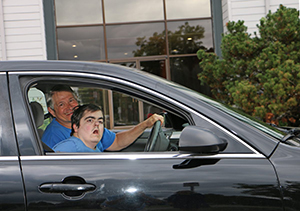The Waisman TIES Clinic, a Psychiatry Clinic that Looks at Disability and Mental Health through a Holistic Lens
July 19, 2023

|
| Mark Kliewer (left), and Daniel Kliewer visit the TIES Clinic at Olin Ave on a Sunday afternoon to pretend to talk to psychiatrist Steve Singer. This is therapeutic and reassuring for Daniel, who has Cornelia de Lange syndrome. |
Mental health is import for individuals with intellectual and developmental disabilities. The Waisman TIES (Training, Intervention, and Evaluation Services) Psychiatric Clinic is a unique resource that provides psychiatric care and consultation to Wisconsin residents with intellectual and developmental disabilities. The clinic often sees individuals who are unable to obtain psychiatric care from other providers due to their insurance, financial situation, behavioral issues, or medical complexities.
The clinic is part of the Waisman Center, University of Wisconsin-Madison’s University Center for Excellence in Developmental Disabilities (UCEDD) and the Community TIES (Training, Intervention, and Evaluation Services) behavioral support program.
The TIES Clinic is distinguished by its comprehensive and holistic approach. A psychiatry session can involve multiple participants: the individual, a psychiatrist, a nurse, and people that are involved in the individual’s life such as parents, job coaches, behavioral support staff, and home managers. This way, they can all provide detailed insight on how the individual is doing in their different environments, and if there are improvements or concerns with behaviors and medications. The nurse also addresses potential causes of distress and behavioral challenges that may be due to a physical discomfort, rather than mental health issues.
“It's integrative. Medication is often necessary for managing mood swings, behavioral changes, frustrations, aggression, anxiety, depression, and it's wonderful to have that resource,” says Steve Singer, MD, one of two psychiatrists at the clinic. “But I am always confident that at TIES the management of a person's life and environment has been addressed with clarity and focus.”
The approach at the TIES Clinic encourages and facilitates independence for individuals with intellectual and developmental disabilities through a process that integrates all of the meaningful areas of their lives, allowing the individual to achieve the best outcomes.
Read the full story here.
By: Charlene N. Rivera-Bonet
Short version







